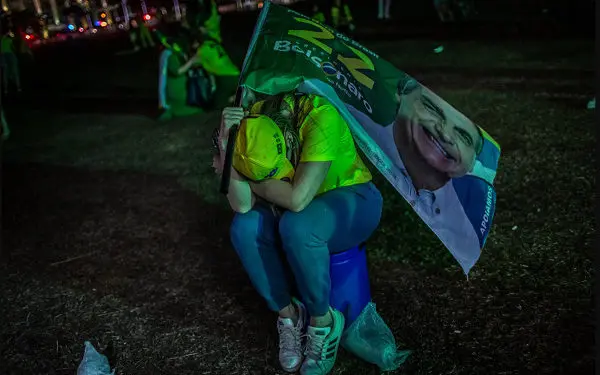By Anthony Faiola and Gabriela Sá Pessoa
On Monday afternoon, the Brazilian outlet Folha de São Paulo reported that Bolsonaro’s allies had drafted a concession speech, and the president was expected to deliver it Monday. The content of the speech was unclear; Bolsonaro was expected to claim he was a victim of injustice, but would not challenge the results.
The Federal Highway Police — close allies of Bolsonaro who allegedly slowed down voting Sunday in areas with heavy backing for Lula — said they had dispatched forces to the protests. But amid claims they were failing to act, federal prosecutors demanded further information on their response.
As tension heightened and Bolsonaro’s intensions remained uncertain, Supreme Court Justice Alexandre de Moraes, the country’s top election official, issued a demand that police use “all necessary measures” to unblock the highways.
To many here, Bolsonaro’s delay is little surprise. The president, his sons and supporters have for months laid the groundwork to contest a loss with unsupported allegations of electoral fraud. Bolsonaro summoned foreign diplomats in July to cast doubt on electronic voting, and claimed last week that national law had been violated because radio stations gave more time during the campaign to Lula.
Election authorities dismissed all those claims as fictitious, and called Sunday’s election secure and valid. If anything, irregular checkpoints set up by police with ties to Bolsonaro in territory loyal to Lula on Sunday appeared to delay voters from getting to the polls.
Former Brazilian president Luiz Inácio Lula da Silva won the presidential election on Oct. 30, defeating incumbent Jair Bolsonaro after a bitter campaign. (Video: Julie Yoon/The Washington Post)
Having followed much of the Trump playbook during his rise to power and in office, analysts say, Bolsonaro could do the same in defeat: refuse to concede, declare Lula’s presidency illegitimate and use his hardcore base to play power broker while preparing for the next election.
His loss comes as the specter of criminal investigations hangs over him and his family.
Even as Bolsonaro resisted acknowledging the result, the world embraced it. It took Bolsonaro months to acknowledge President Biden’s 2020 victory — and seemed to question his legitimacy as recently as June. “I will not discuss the sovereignty of another country,” Bolsonaro told journalists. “But Trump was doing really well.”
Biden quickly threw Washington’s backing to Lula’s corner, publicly congratulating the 77-year-old icon of the left shortly after his victory Sunday and speaking with him by phone on Monday.
Other leaders have rallied to Lula. Argentina’s president, Alberto Fernández, was set to meet with Lula on Monday in Brazil. Lula’s “victory opens a new era for the history of Latin America. A time of hope and future that begins today,” Fernández said on Twitter. “Here you have a partner to work and dream big with for the well-being of our nations.”
Bolsonaro, like Trump, has an adoring base. Some supporters began blocking Brazil’s highways late Sunday, demanding he refuse to concede. Police on Monday morning reported an escalating number of blockades.
One congressman who represents truckers said the roadblocks were the work of “criminals who do not represent the category.” “The Parliamentary Group of Independent Truckers does not support any kind of demonstration against the outcome of the elections!” Nereu Crispim tweeted. After the result Sunday, the Rio Grande do Sul lawmaker said democracy had won and “hate has lost.”
The company that manages highways in Mato Grosso state said at least four stretches of road were blocked. “Lula will not be our president,” a woman says in a video posted by the news outlet O Globo.













